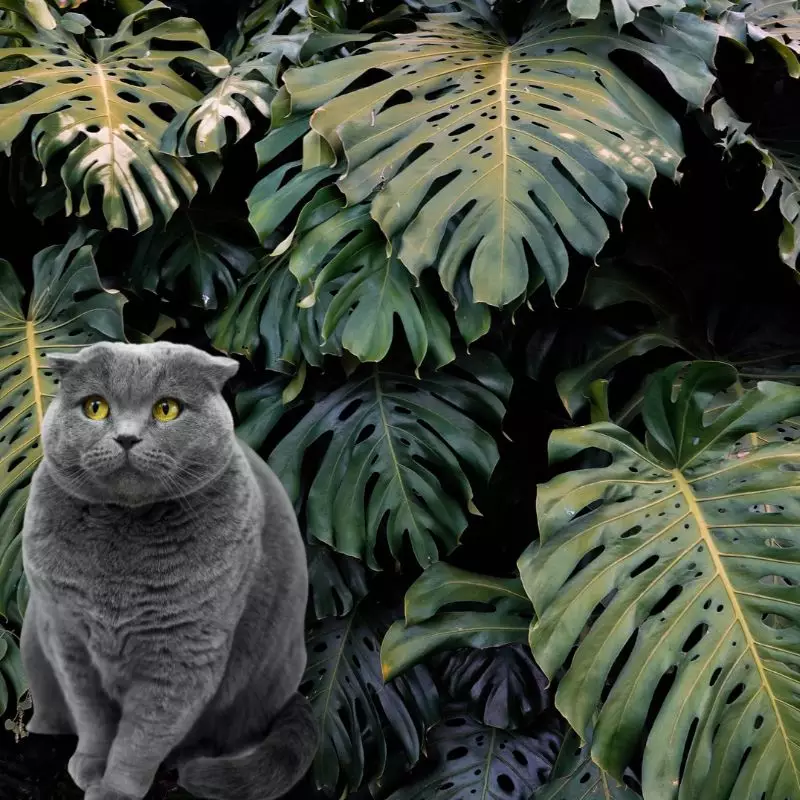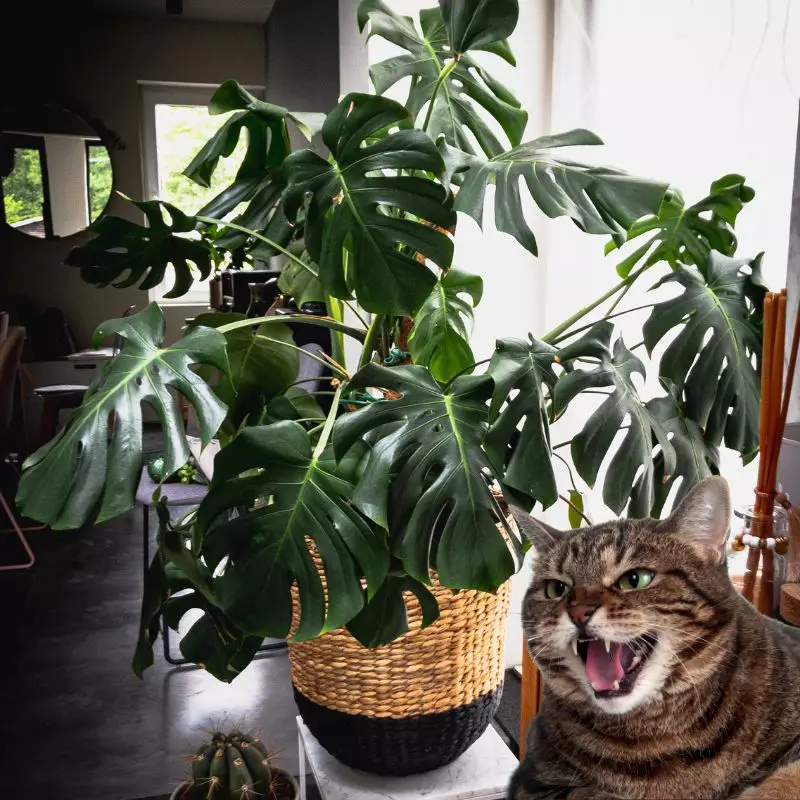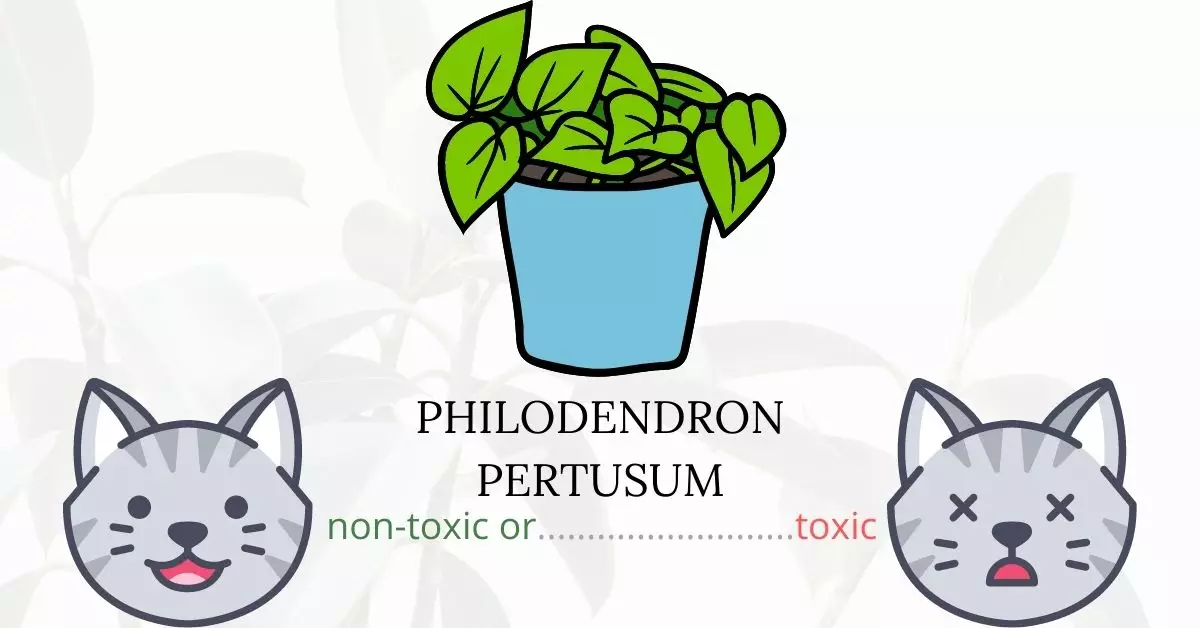Yes, Philodendron Pertusum is toxic to cats. This plant contains calcium oxalate crystals which, when ingested, can embed themselves in the tissues of the mouth, tongue, throat, and stomach, causing immediate discomfort and aggravation in cats.
This article was written in collaboration with a team of experienced DVMs (doctors of veterinary medicine). Thanks to their insights, we can offer accurate and up-to-date information about the potential risks associated with Philodendron Pertusum and its effects on our feline friends. Furthermore, to ensure comprehensive coverage and accuracy, we consulted high-authority websites such as ASPCA and PetMD when researching the toxic effects of this and other plants.
Clinical Signs of Philodendron Pertusum Poisoning in Cats

Philodendron Pertusum, when contacted, smelled, or ingested by cats, can lead to a series of significant clinical signs due to the presence of calcium oxalate crystals, which can persist up to two weeks post-ingestion. These symptoms might vary, depending on the quantity of the plant consumed, and they illustrate the plant’s toxic effects on cats as outlined below:
- Severe Burning Sensation of the Mouth, Throat, Lips, and Tongue: This is caused by the calcium oxalate crystals found in the plant. These crystals penetrate and embed themselves into the tissues, causing immediate pain and irritation.
- Excessive Drooling: The irritation and burning sensation in the mouth and throat lead to increased salivation as the cat’s body attempts to soothe the affected areas and expel the toxic elements.
- Choking and Swelling of the Throat: The embedded crystals can cause inflammation and swelling, obstructing the airways and inducing a choking sensation.
- Difficulty or Inability to Swallow (Dysphagia): The swelling and irritation in the throat make swallowing extremely difficult and painful for the affected cat.
- Vomiting and Diarrhea: These are the body’s natural response mechanisms to expel the ingested toxins, resulting in gastrointestinal upset.
- Extreme Difficulty Breathing: The swelling in the throat can restrict airways leading to labored breathing.
- Rapid Shallow Gasps (Dyspnea): This results from the distress in the respiratory system, as the body struggles to secure adequate oxygen due to obstruction or inflammation caused by the plant’s toxins.
Each of these clinical signs is a critical indicator of Philodendron Pertusum poisoning and requires immediate veterinary attention to alleviate the symptoms and prevent any long-term damage to the cat’s health. The severity of these symptoms can escalate depending on the amount of the plant material contacted or ingested by the cat.
First Aid and Treatment of Philodendron Pertusum Poisoning in Cats

If your cat has ingested a plant containing calcium oxalate, the mouth should be thoroughly rinsed and flushed with water. The cat can then be given yogurt, milk, cheese, or any other calcium-containing food to alleviate pain by possibly precipitating some of the calcium oxalate crystals.
If the pet cat is enduring more severe gastrointestinal upset, persistent vomiting, and diarrhea, they should be closely monitored for signs of dehydration. In this case, taking the cat to the veterinarian is necessary to receive fluid therapy.
It may be prudent to administer an antihistamine, such as diphenhydramine, to the pet as a preventative measure as well as in cases where there is obvious oral swelling. This will help to reduce swelling, discomfort, and potential airway blockages caused by the body’s inflammatory response.
Other medications, such as Kapectolin and sucralfate, may be prescribed by the veterinarian to relieve the cat’s gastrointestinal upset. Depending on the cat’s condition, the vet may also recommend other treatments.
Recovery from Philodendron Pertusum Poisoning in Cats

The vast majority of cats will recover completely within 12 to 24 hours after ingestion. Allow your cat to relax comfortably in a warm, stress-free environment when you get home to aid his speedy recovery.
Prevention of Philodendron Pertusum Poisoning in Cats
If you are growing philodendron pertusum at home, it is best to just get rid of it by giving it to a friend without pets. To lessen the possibility of getting in contact with toxic plants in your neighborhood, keep your cats busy and stimulated indoors.
If you love plants but have cats at home, check out these lists:





